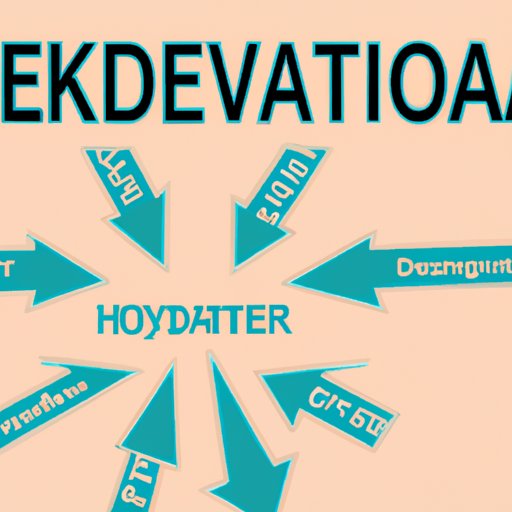
The Dangers of Overhydration: Exploring Can You Over Hydrate?
Water is the elixir of life. We all need it to survive, and we are constantly reminded to drink more. But can you overhydrate? The answer is yes, and the consequences can be fatal. In this article, we’ll explore the risks of overhydration, how to assess your body’s hydration needs, and how to stay hydrated safely.
The Dangers of Overhydration: Here’s What You Need to Know
Hyponatremia and cerebral edema are two of the most serious health risks associated with overhydration. In extreme cases, overhydration can be fatal. Athletes consuming large amounts of fluids and people with certain medical conditions are at higher risk for overhydration. If left undetected, overhydration can cause seizures, brain damage, coma, and even death.
Hydration: How Much is Too Much?
What is the right amount of water to drink each day? It depends on several factors, such as your age, weight, activity level, and environmental conditions. Drinking too little water can lead to dehydration, which can cause headaches, constipation, and decreased physical and mental performance. Drinking too much water can cause overhydration and impair the body’s functioning.
Can You Drink Too Much Water? Exploring the Risks of Overhydration
The body has a self-regulating mechanism that controls fluid balance, thirst. Drinking water when thirsty is usually enough to meet the body’s needs. Drinking more water than the body needs can lead to water intoxication. Different types of fluids have different levels of hydration potential, and too much of one type of drink or too little of another can affect the body’s overall fluid balance and lead to overhydration.
Overhydration: Signs, Symptoms, and Prevention
The signs and symptoms of overhydration can vary depending on the severity of the condition. Mild to moderate symptoms include nausea, headache, vomiting, and confusion. In more severe cases, seizures, brain swelling, and coma can occur. The best way to prevent overhydration is by monitoring your fluid intake and listening to your body’s signals.
The Science Behind Overhydration: What Happens to Your Body?
Overhydration can lead to an imbalance in the body’s electrolytes, primarily sodium. The kidneys work to excrete excess fluids, but when too much water is consumed, the kidneys are overwhelmed and can’t keep up. The result is a drop in the sodium concentration in the blood, which can cause swelling in the brain and other parts of the body.
How to Stay Hydrated Without Overdoing It
Gradually increasing your water intake over time can help your body adjust to higher levels of hydration. Another way to stay hydrated is by eating foods with high water content, such as fruits and vegetables. If you’re working out, make sure to replenish lost fluids with a sports drink that contains electrolytes.
The Impact of Overhydration on Athletic Performance: What Athletes Need to Know
Overhydration can negatively affect an athlete’s performance by altering electrolyte balance, causing cramping and muscle fatigue. It’s essential for athletes to stay hydrated during training and competition, but also to avoid overhydrating by following a well-planned hydration strategy that considers individual needs and environmental conditions.
Conclusion
Staying hydrated is essential for optimal health, but it’s crucial to understand the signs and symptoms of overhydration and how to prevent it. Assessment of body’s fluid needs, gradual introduction of high fluid intake and paying attention to thirst are some simple but effective ways to avoid overhydration. Whether you’re an athlete or a couch potato, we hope this article has helped you better understand the importance of hydration and how to maintain it safely.





